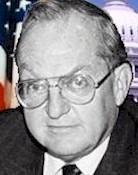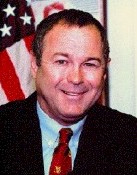
Rep. Coble
House Committee Holds Hearing on Patent Reform
(March 29, 1999) The House Courts and Intellectual Property Subcommittee began its consideration of patent reform legislation in a hearing on Thursday, March 25, 1999. In the last Congress the House, but not the Senate, passed a sweeping patent reform bill.
| Related Page: Summary of Patent Reform Bills in the 106th Congress. |
The hearing focused on the "American Inventors' Protection Act," a bill which Rep. Howard Coble (R-NC) is likely to introduce soon. The committee also addressed HR 1225, the U.S. Patent and Trademark Office Reauthorization Act, Fiscal Year 2000."
The American Inventors' Protection Act is the reincarnation in the 106th Congress of HR 400 from the 105th Congress. HR 400 passed the House in 1997. However, the Senate version of the bill, S 507, was not passed. Several members of the subcommittee expressed their frustration over Senate inaction. "I cannot understand why there is not common ground for speedy resolution," said Rep. William Delahunt (D-MA). "We thought this was going to be a non-chalant walk in the park -- this HR 400."
 |
|
Rep. Coble |
"We don't want to repeat what happened last time. This literally sailed through the House. Pardon my immodesty," said Rep. Coble. "But over on Mount Olympus it did not do too well."
The current bill, which has not yet been formally introduced, was released to the public at the hearing in the form of a "Committee Print." It is 90 pages long, and contains many of the provisions of the old HR 400.
Rep. Coble described the purpose of the bill in his opening statement. "To advance American technology, strengthen our nation's global competitiveness, and to reward inventors on a more timely basis, we can't live with a patent system much of whose structure predates even the emergence of biotechnology, semiconductors, software, Internet and electronic commerce applications, and other high-growth technologies. This is not a big versus small debate. It is about making sure that the U.S. patent system is not undermined by our inaction. Reforms of the U.S. patent system are needed now. Our nation can ill afford for Congress to delay any further in enacting comprehensive amendments to our Patent Act ..."
The major reforms contained in the draft bill include the following:
The Subcommittee heard from two Congressmen from California: Rep. Tom Campbell (R-CA) from Silicon Valley, and Rep. Dana Rohrabacher (R-CA), from Orange County. Neither are members of the Subcommittee. Hence, they testified as witnesses. The Subcommittee also heard from a panel comprised of PTO Commissioner Todd Dickinson, representatives of two unions representing PTO workers, and representatives of several trade groups.
| First to Invent Defense |
Several subjects addressed at the hearing are the subject of some controversy. One is the "first to invent" or "prior use" defense to patent infringement claims. Title II of the draft bill would create a new § 273 containing this defense.
Excerpt from Title II |
| (b) DEFENSE TO INFRINGEMENT.---. (1) IN GENERAL.---A persons shall not be liable as an infringer under section 271 of this title with respect to any subject matter that would otherwise infringe one or more claims in the patent being asserted against such person, if such person had, acting in good faith, actually reduced the subject matter to practice at least one year before the effective filing date of such patent, and commercially used the subject matter before the effective filing date of such patent. |
It has both strong supporters, and ardent opponents. For example, Michael Kirk, of the American Intellectual Property Law Association (AIPLA), said the "There are a number of reasons why it is not feasible or even possible to patent every invention which could be patented. First and foremost are costs."
Kirk continued that in the case of "industrial process technology" there are added concerns. "Identifying a competitor's use of a patented process can be extremely difficult in the United States and virtually impossible in foreign countries." Thus, obtaining a patent reveals your technology, but provides little protection from infringement. Kirk stated that "many U.S. companies, and especially smaller U.S. companies, are forced to forego patenting of many inventions."
"Practicing the technology in secret is more effective." said Kirk. This reform is needed to protect these companies from being enjoined by subsequent users of the technology who obtain a patent.
In contrast, Rep. Campbell opposed this proposal in his opening statement. He opposes it on the grounds that disclosure of inventions is one of the fundamental goals of the patent laws, but this exception gives inventors an incentive not to disclose.
 |
|
Rep. Rohrabacher |
Likewise, Rep. Dana Rohrabacher argued in his prepared statement that "we simply cannot champion trade secret protection over patent protection for clearly patentable subject matter. We cannot betray our Founding Fathers by abandoning the foundation upon which our patent system is based."
"We cannot allow state-based rights to trump long-standing Federally created intellectual property rights. We cannot openly advocate secrecy when our patent system calls for us to vigorously promote the progress of science through the sharing of critical technology information."
Rep. Rohrabacher suggested that a possible compromise might be to recognize prior user rights for processes, but not for products.
| Submarine Patents |
The terms "submarine patent," and the "submarining of patents," are metaphoric descriptions of a patent practice, which regarded by many as insidious. It involves the filing a broad patent application, then engaging in dilatory tactics to perpetually delay the PTO, and hence, "submarine" the application. Then, long after, when someone else has put in the effort to commercialize the invention, "resurface" the application. The consequences for smaller companies victimized by this practice can be catastrophic.
Such submarine patents would be discouraged by Title III of the "committee draft" because the patent expiration date would be measured from the date of filing the application (not the date of granting the patent), and extensions would not be granted if delays resulted from the dilatory tactics of the applicant.
This practice was widely condemned at the hearing by members of the Subcommittee and witnesses alike. No one at the hearing stood up for the practice of submarine patents.
| Disclosure of Patent Applications |
This is another thorny issue. Under current law patent applications are kept secret until a patent is issued. Yet disclosure serves a purpose. Norman Balmer, of the Intellectual Property Owners Association (IPO), stated that "publication of applications will eliminate duplication of research and accelerate research into new areas by making information about developments available ..." He also stated that "publication of patent applications within a reasonable time is one of the most needed reforms in U.S. patent law"
Title IV of the "committee print" would require the publication of patent applications 18 months after filing if the application is also being filed abroad in a foreign country that requires publication of applications 18 months after filing. Present law keeps patent applications secret until a patent issues.
This is a compromise provision. While some, such as the IPO, argued for mandatory publication of all patent applications, in the interest of dissemination of information, the "committee print" would create a carve out to this18 month rule for applicants only seeking U.S. patents.
| Patent Fees |
This is another serious subject in the intellectual property community. Currently, the PTO is not only fully supported by fees collected from applicants, but it turns a profit which is used to subsidize other government programs. Rep. Zoe Lofgren (D-CA) called this a "tax on innovation." She said that fees paid by intellectual property holders are "bled off into the general fund through the back door."
Robert Tobias, of the National Treasury Employees Union, supports allowing "the PTO to retain and use all of its revenues and receipts. The PTO is a fee-funded operation receiving no appropriated, taxpayer funds. It is not proper for its revenues to be siphoned off ..."
The Clinton administration, and especially the Office of Management and Budget, supports the current system. The Clinton FY 2000 budget calls for the PTO to collect $160 Million more in fees than it will spend to fund its operations.
What They Said |
|
| Rep. Howard Coble (R-NC),
opening statement. Rep. Dana Rohrabacher (R-CA), prepared testimony. Rep. Tom Campbell (R-CA), transcript of testimony. Todd Dickinson (Patent and Trademark Office). |
Hypertext links are to HTML documents in Tech Law Journal. |
| Michael Kirk
(Am. Intellectual Prop. Law Assoc.) Norman Balmer (Intellectual Property Owners.) Kimbley Muller (International Trademark Assoc.) Charles Ludlam (Biotechnology Industry Org.) Robert Tobias (Nat. Treasury Employees Union.) Ronald Stern (Patent Office Professional Assoc.) |
Hypertext links are to HTML copies of prepared testimony in House Judiciary Comm. web site |
The hearing lasted just over two hours. The members of the subcommittee who participated in all or part of the hearing included Chairman Howard Coble, Ranking Minority Member Howard Berman (D-CA), Zoe Lofgren (D-CA), Bob Goodlatte (R-VA), William Delahunt (D-MA), Gerald Wexlar (R-IL), and Edward Pease (R-IN).
Rep. Coble and Rep. Lofgren were present for almost the entirety of the hearing, and were active in questioning witnesses. Others, such as Rep. Pease, Rep. Goodlatte, and Rep.Wexlar mostly sat and listened.